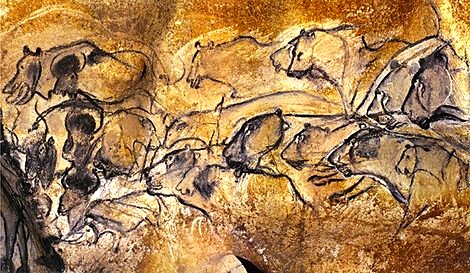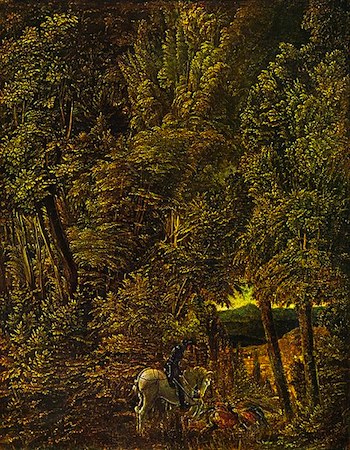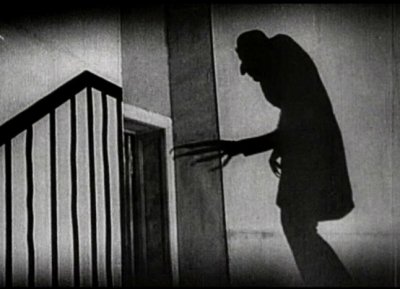In Part I of my interview with Werner Herzog, we discussed his new movie Into the Abyss and its searing exploration of evil in human society. Now in Part II we turn to the world of nature, which Herzog sees as even more dangerous. In Les Blanks' documentary Burden of Dreams, Herzog famously spoke out on the "obscenity" of the jungle, its "harmony of overwhelming and collective murder." In Herzog's documentary Encounters at the End of the World, he expressed skepticism toward "tree huggers and whale huggers," while in Grizzly Man, he documented the fate of a man literally killed by his unhealthy obsession with wild nature. Herzog has even criticized the romanticizing of nature in Avatar, calling the film "an abomination because of its New Age schlock and bullshit."
Obviously Werner Herzog has strong feelings about the proper relationship between humanity and nature. One sees this, for example, in Herzog's stunning documentary Cave of Forgotten Dreams, released this week on DVD. Cave of Forgotten Dreams offers an extraordinary look at the 30,000 - 32,000 year-old Paleolithic cave paintings inside the Chauvet Cave in southern France - currently considered to be the oldest cave paintings in the world. As Herzog told me in Part I of our discussion on the concept of "the abyss," "I've always tried to look deep inside of what we are - deep into the recesses of our existence, of our prehistory - like in Cave of Forgotten Dreams. So it is some sort of a theme that runs through quite a few of my films."

In Cave of Forgotten Dreams, Herzog speaks eloquently of the Paleolithic cave paintings of Chauvet and their relationship to the surrounding landscape:
"These images are memories of long-forgotten dreams. Is this their heartbeat, or ours? Will we ever be able to understand the vision of the artists across such an abyss of time? [Camera shows a massive natural stone arch in the landscape.] There is an aura of melodrama in this landscape. It could be straight out of a Wagner opera or a painting of German Romanticists. Could this be our connection to them? This staging of a landscape as an operatic event does not belong to the Romanticists alone. Stone Age man might have had a similar sense of inner landscapes ..."
And yet despite these poetic sentiments, Herzog vehemently denies being a Romantic; rather, he defines his approach to nature as being similar to that of the artists of the late Middle Ages.
Ultimately, if one were to search for a theme that unites Werner Herzog's diverse body of work, it would be that respect for human life and its limits is what holds us back from the brutality of amoral nature - the abyss into which humanity's natural instincts might otherwise plunge. As Herzog told me, he is concerned above all with civilizational breakdown - with how humanity can abandon its own heights to descend into unfathomable depths of madness and annihilation. Equally importantly though, Herzog's love of art, of literature, of joyful exploration of the world and its peoples points to a hopeful way out of the abyss and into the light of day.
Thus, in Part II of this interview, we tackle such colorful subjects as Herzog's anti-romantic views on nature, why he can't help ranting about Avatar, his excitement over his Rogue Film School (in which he teaches such crucial skills as "lock picking" and "neutralizing bureaucracy"), and his belief that Wrestlemania and reality TV offer vital clues to understanding civilization. The interview has been edited for length.
GM: There is this sense in all of your films, whether they're historical dramas or contemporary documentaries, that you wish to explore the extremes. You go from examining the molecular world in scenes from Encounters at the End of the World to these broad vistas of Antarctica or the desert or the Himalayas in your other documentaries. Do you feel that you're part of what could be termed the German Romantic tradition in terms of having this approach to nature - seeing it both as a place of danger and a place of inspiration?
WH: I think that's a common misconception [that] I had an affinity to romantic culture - no I don't. I do not feel much affinity with it. I don't feel at home with it. I'm much closer to poets like Heinrich von Kleist, Georg Büchner who wrote Woyzeck - in the early 1820s he wrote literature that belonged to the early 20th century, that was almost like Expressionism. Or Hölderlin the poet, and he's not a Romantic poet either. He's somewhere completely unique. He's like a continent of his own - not really comparable to other Romantic writers of his time...
And when you look at how I depict nature - wild nature for example in Grizzly Man, it's quite evident that it's a completely anti-Romantic view. Timothy Treadwell who was protecting bears and who was killed and eaten by a grizzly bear together with his girlfriend, he has this kind of watered down Romanticism ... that's what I'm completely against. I would stop the course of the film even and in my comment I would have an ongoing argument with Treadwell: "Here I differ from Treadwell." I do not see wild nature as something benign and beautiful and the bears fluffy like little pets. No, they are dangerous and aggressive and nature itself looks rather chaotic and hostile. You look at the universe - it's very, very hostile out there.
For example in Les Blanks' Burden of Dreams I deliver a speech/rant about the jungle and you'll never see anything so clearly against Romanticism and the romanticizing of landscapes, romanticizing of wild nature. ... It's funny because being a German everyone immediately thinks yeah yeah he must have an affinity with Romantic culture. No, I don't.
GM: I think I see multiple sides to Romanticism. It's such a complex movement. What I was thinking of was not so much the warm, romantic with a small 'r' approach to nature but the approach that sees it as terrifying and overwhelming. For example, even going back into 16th century German art I think of Albrecht Altdorfer with his landscapes towering over very small figures, or of Bruegel's Landscape With the Fall of Icarus with the human figures very small in the distance, on through Caspar David-Friedrich's work [in the early 19th century] where you have the two extremes - you either have humanity dwarfed by nature, as in The Monk on the Seashore or you have humanity standing titanic over nature, as in The Wanderer over the Sea of Clouds. So it was in that sense I was asking about nature. Your quote was very striking [in Burden of Dreams] where you mention the jungle as being "full of obscenity ... nature here is vile and base."
WH: Yeah. Obscenity - that was because Kinski kept saying everything is erotic. And he would hug a tree and fornicate with it. [Laughs] Which is really against my inner convictions.
GM: But this comment about the 'harmony of overwhelming and collective murder' - setting aside Kinski's comments, is that how you would see that particular jungle, or nature in general?
WH: No, you would have to be a little bit cautious. It's a rant 'against' the jungle, but it came at a time of enormous strain on me - weeks and weeks and weeks where there was every single day a major disaster. And when I speak of major disaster I mean disasters like two plane crashes. Two consecutive plane crashes, and on and on and on. So, yes you have to see it in the context. But otherwise, thinking about the jungle, it's not completely wrong what I said. But the ferocity of the rant is in a way a result of enormous pressure of disasters one after the other. ... And it's OK, I still like my rant.
GM: It's achieved a cult status on-line. People enjoy it a great deal.
WH: But let me go back to when you speak of Altdorfer [see image below of Altdorfer's St. George in the Forest] - or Matthias Grünewald. Yes, that's where I feel much more affinity: late Middle Ages. But not Romanticism.

GM: And you have an interest in classical culture as well. I saw from your application for your Rogue Film School that you tell people to read Virgil.
WH: [laughs] I do not tell it - it is mandatory. But it's actually Virgil's - not the Aeneid.
GM: But I love the Aeneid!
WH: Yes, so do I, but it's more the programmatic, big writing about celebrating the Roman Empire, celebrating the Augustean Empire, celebrating the evolution of the Roman republic into an empire. ... [It's]the Georgics - it's about agriculture ... about farming. And the beautiful thing is it does not explain anything - it just names the glory. It names the glory of pruning the apple trees, and it names the glory of the bee hive, and it names the terror of the pestilence invading the stables and killing off all the sheeps and goats. So I make it mandatory.
You've got to be serious if you want to apply to my film school. And applications, by the way, are open right now. I do it infrequently and at various locations whenever I have time for it. Basically Rogue Film School is an answer to an ever-increasing avalanche of young people who want to learn from me or work with me. I try to give a more systematic answer to it. There's a mandatory reading list among other obstacles you have to overcome. You have to send in a written application, you have to send in a short film - and I read and watch every single piece.
And I'm the only one who ultimately makes the choice whom I invite. So it's serious stuff. And of course it's not just Roman antiquity included in the reading list. It includes the Warren Commission Report on Kennedy's assassination, which is a wonderful piece of reading. It's the ultimate crime story. Phenomenal in its conclusiveness and in its intelligence and I keep saying everybody puts it down without having read it. Just read it and you can't get it any better.
GM: The Warren Commission Report, plus the Georgics - plus your reading list also includes Rabelais' Gargantua and Pantagruel and Bernal Diaz's The Conquest of New Spain. What effect do you think this variety of reading has on the filmmakers in your school?
WH: Well, I point one thing out: Read, read, read, read, read, read, read, read, read, read, read read. If you don't read you will never be a filmmaker - a good filmmaker. So, these five or six books could be replaced by five thousand others. I might include a new book I just read that is [an] absolutely beautiful, wonderful piece. It's called The Peregrine, by an English completely unknown person, J.A. Baker, who watches peregrine falcons. It was published in 1967 and there seems to be a new discovery going on of this book. It is phenomenally beautiful in its prose and in the precision of observation and this kind of - this unbelievable quest to meet the peregrine and an ecstasy of observation ... Sometimes the writer lapses into "we": "the peregrine saw us and swoops down and then we swooped down" so it is as if he were morphed into falcon.
GM: Somewhat like Timothy Treadwell [in Grizzly Man] wanting to morph into the grizzly bear.
WH: Yes, but the book has a phenomenal precision and quest and beauty. Can't compare with Treadwell, that was just a misunderstanding, bears as being fluffy pets.
GM: An over-identification with them. Well you make the good point that there are limits between humans and nature, and the Native American man [in Grizzly Man] makes the same point about having a sense of limits.
WH: Yes, I think there was a massive misunderstanding of what constitutes wild nature. It's a very tragic misunderstanding because it cost two human beings their lives and and at the end it cost two bears their lives who had to be killed by rangers. ... The native Aleut people, for example, say very clearly you shouldn't love the bear, but rather you should respect the bear. I think this is a very fine difference. ...
GM: You've said you have an opposition to New Age culture ... You're opposed to yoga, nutritional supplements, self-help [Herzog laughs] and I found a quote of yours [in Planet Magazine] about Avatar - that you considered Avatar "an abomination because of its New Age schlock and bullshit," despite its other accomplishments in terms of technique.
WH: Yes, we should not forget the accomplishments, but it makes me cringe, the New Age sort of content makes me cringe.
GM: So is it the element of pantheism, or that it's this degraded Romanticism?
WH: Well, it has lots of things in it abominable, like degraded Romanticism, also, what did you say?
GM: Pantheism.
WH: Pantheism, yes, yes, yes.
GM: Inspired by Spinoza.
WH: Yeah, making nature as the ultimate God. Whatever. It combines all the stupidities of our time, not only these two stupidities, but it's somehow the embodiment of stupidity and I just can't take it without ranting. [laughs]
GM: So you have greater hope for humanity on its own - or for humanity and civilization perhaps? Or for rational progress? Do you believe in rational progress?
WH: Well, we should be cautious about that. Because the ice of rationality and civilization is kind of thin, this thin ice breaks easily and beneath there is an ocean of barbarism. And you can see it with Germany - a very civilized country with great poetry, philosophy, music and all this and within a very few years it lapses into a state of utter barbarism, and I mean an amount of barbarism we have not seen in millennia.

GM: How do you prevent that in the future from coming back? How do you foster a humanistic culture?
WH: Well, how do we prevent it? I do not know. It has really engaged my thinking. It's a very, very important question. I even traveled to Africa when I was eighteen. I wanted to go ... to the Congo, right after its independence because it was a breakdown of civilization and absence of everything that would be order - tribalism, and killings, [it was] staggering - and I tried to understand what was going on with Germany [by seeing] this, but I actually never made it to the Congo, I became very ill in the Sudan and I barely made it back alive.
GM: Do you think Weimar cinema of the '20s predicted some of the Nazi barbarism? Or was it perhaps more just a symptom of it?
WH: [Exclaims] Maybe, yes, in retrospect, now we can say there was some sort of a vision of something dark coming. Nosferatu [photo above] is the best example, or Cabinet of Dr. Caligari is a good example. But they do not really explain - they had this mood of something impending - very dark coming at us. So cinema sometimes has a way to figure out the mood of something coming at us. So this is why I'm taking a good look at what is going on in mainstream cinema, and taking a good look at what television does, with Wrestlemania, and the Anna Nicole Smith Show, because the poet must not avert his eyes.
GM: It all reveals something - all the details. I look at the cinema and I believe it unconsciously reveals things that may be coming in politics or culture or society. There are very fascinating themes ... I even see Weimar themes returning in some of the cinema today.
WH: Yes, but it's not necessarily a direct parallel to ahead of time what's coming - that would be dangerous. But sometimes these moments in cinema occur where you have the feeling , yes, yes, there is a premonition in the films.